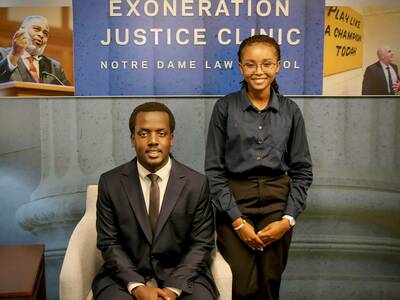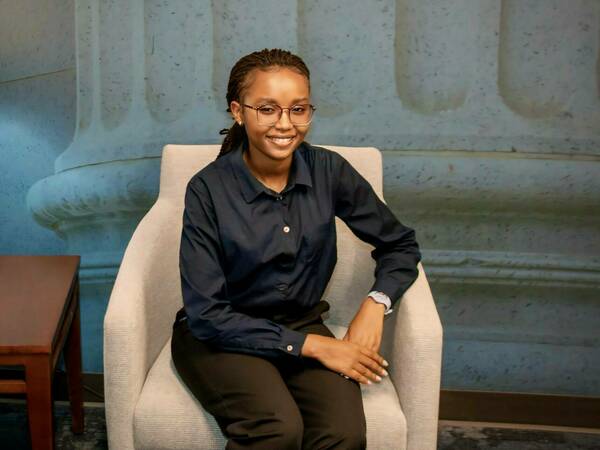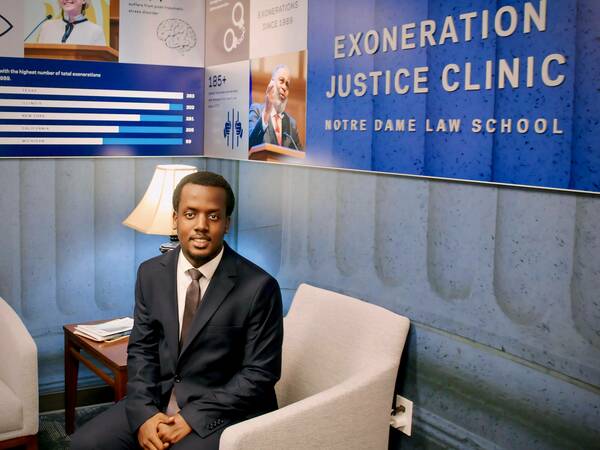From Nairobi to Notre Dame: Strathmore Law School Students Pursue Internships at ND Law’s Exoneration Justice Clinic

Two rising third-year students from Strathmore Law School in Nairobi, Kenya, participated in a unique and collaborative opportunity this summer through internships with Notre Dame Law School’s Exoneration Justice Clinic (EJC).
Strathmore Law School students Nelly Irungu and Kwezi Mpyisi spent three weeks as Exoneration Justice Clinic interns alongside a group of second-year Notre Dame Law students, undergraduate Notre Dame seniors, and undergraduate students from St. Olaf College.
“Nelly and Kwezi brought a diverse cultural and experiential perspective to the summer program that greatly enhanced the work of the EJC,” said Professor Jimmy Gurulé, director of the Exoneration Justice Clinic at Notre Dame Law School. “They were tireless workers who made an immediate, positive impact on advancing our wrongful conviction cases. They enriched the summer program in immeasurable ways.”
For Irungu and Mpyisi, the three-week program at Notre Dame Law School’s Exoneration Justice Clinic presented them with new insights and valuable experiences to further develop their legal research skills. They looked at an intake case and evaluated whether the EJC should take up the case and investigate it further; read trial and appeal transcripts; reviewed and analyzed the evidence used by the prosecution; and determined if there are potential avenues for legal relief. They also visited Putnamville Correctional Facility, a prison located in Putnam County, Indiana.

“Through this experience, I have been able to draw parallels between our criminal justice system in Kenya and the criminal justice system in the United States, see the shortcomings of both systems, and learn how both systems can be improved,” said Irungu.
“This has been a valuable experience because I’ve been able to interact with the different students who are also taking part in the Exoneration Justice Clinic,” said Mpyisi. “This has allowed me to learn from them, as well as learn about ways to improve the criminal justice systems both in the U.S. and in Kenya.”
One major difference between the U.S. and Kenyan criminal justice systems is that Kenya’s system does not provide for a jury trial. Only a magistrate, judge of a high court, or panel of judges on the appeals court render decisions in criminal cases.
Both Irungu and Mpyisi are involved in the Strathmore Law Clinic at their university in Nairobi, Kenya, where they conduct legal research on criminal justice and human rights issues. Strathmore Law Clinic’s Criminal Justice Unit works on remand cases for clients who have entered a plea, but have not yet been convicted. Through research and litigation, the Strathmore Law Clinic works to ensure that its clients receive justice.
Irungu and Mpyisi agreed that, through their internships at the EJC, they attained and developed useful skills and knowledge that they will be able to apply as legal practitioners. In the future, Irungu seeks to pursue either clinical legal education or tax law, while Mpyisi wants to work in the criminal justice area after graduation.

“I find it important to improve access to justice within Kenya, especially to people who can’t afford legal aid,” said Mpyisi.
The internships were made possible through the Law School’s continued exchange program with Strathmore Law School, established in 2022 by Notre Dame Law School’s Global Lawyering Initiative. In June 2023, Strathmore Law students Irene Agingu and Esther Kangai spent two weeks as Exoneration Justice Clinic interns.
“The EJC staff and students, as well as our clients, have been the beneficiaries of the Strathmore University Law School student exchange program. I look forward to welcoming two Strathmore University students to the EJC next summer,” said Gurulé.
Visit exoneration.nd.edu to learn more about Notre Dame Law School’s Exoneration Justice Clinic.